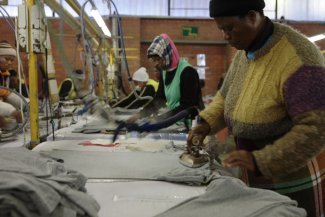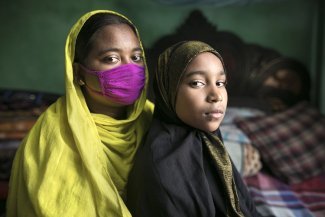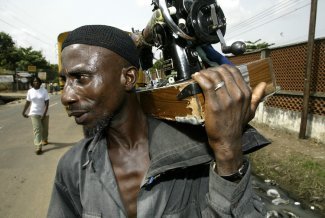Sam Mokhele, secretary general of Lesotho’s National Clothing Textile and Allied Workers Union (NACTWU) and Matsie Moalosi, education and awareness raising facilitator of the NACTWU, speak at the M-POWER High-Level Summit on Eradicating Gender-Based Violence and Harassment at Work in Southern Africa, held in Maseru, Lesotho on 27 July 2023.
According to the United Nations country office in Lesotho, the southern African kingdom is one of the most dangerous places to be a woman or a girl, with some of the highest rates of sexual and gender-based violence in the world. In addition, Lesotho is the second largest exporter of garments and textiles in Africa after Kenya, with the sector holding the position of being the largest private-sector employer in the country, with 80 per cent of garment and textile workers being women.
It is against this backdrop that representatives of local, regional and global trade unions, civil society and various governments, including the Prime Minister of Lesotho, gathered in Maseru this July to highlight models and discuss strategies to eliminate gender-based violence and harassment (GBVH) in the world of work. Lesotho’s groundbreaking efforts in this field were a prominent focus of the meeting.
The M-POWER High-Level Summit on Eradicating GBVH at Work in Southern Africa – organised by the US Department of Labor’s Multilateral Partnership for Organizing, Worker Empowerment and Rights (M-POWER), the Lesotho Federation of Trade Unions and the Lesotho Labour Council – was held in Lesotho’s capital city of Maseru on Thursday 27 July 2023. There, over 100 attendees from countries across southern Africa, Europe, Argentina and the United States heard how, in the space of less than five years, Lesotho has made serious strides towards eliminating GBVH in the workplace, beginning with a series of landmark collective agreements signed by three leading apparel brands, a major supplier of denim, and a coalition of labour unions and women’s rights organisations.
It began with an investigation carried out between 2017 and 2019 by the US-based labour rights monitoring organisation the Workers’ Rights Consortium (WRC), which exposed widespread gender-based violence and sexual harassment at three garment factories run by the Taiwan-based Nien Hsing Textile Co.Ltd., which supplies international brands Levi Strauss & Co., Kontoor Brands (Lee and Wrangler Jeans), and The Children’s Place.
WRC’s investigations discovered that managers, supervisors, and even male co-workers, coerced many women garment workers into sexual relationships by linking their compliance to the maintenance of employment contracts and the provision of more favourable working conditions.
“[…] management often failed to take disciplinary action against offenders,” said the report. “This tolerance of harassment by Nien Hsing created a culture of acceptance of gender-based violence and harassment in the factories and a fear of reporting among women workers.”
It continued: “The vulnerability of women workers at these factories to GBVH was exacerbated by Nien Hsing’s suppression of workers’ associational rights, which left employees unable to act collectively to raise concerns about, and demand an end to, these abuses. The WRC found that Nien Hsing denied employees the right to be represented by their chosen union; attempted to interfere with internal union matters; unilaterally terminated a memorandum of understanding with one of the unions representing workers at the factories; and engaged in acts of discrimination and retaliation against employees for exercising their associational rights.”
Using C190 to create a landmark agreement
Prior to the Covid-19 pandemic, an estimated 10,000 people, mostly women, worked at five Nien Hsing textile facilities in Lesotho: Global Garments, C&Y, Nien Hsing International, Glory International and the Formosa Textile Company. Today, fewer than half that number of workers remain. According to Popoti Ntebe, a Nien Hsing garment worker who spoke at the July summit, workers used to wait at the gates every morning to be picked to work for the day, with the male supervisors previously only picking those they had a “desire to have sex with”.
“They did that because they felt they had more authority. And we agreed just because we are desperate for work,” Ntebe told attendees. She continued to say that supervisors would only give female workers daily or short-term contracts, and that their renewal would be contingent on continued sexual relationships with the factory supervisors and managers. This unlawful practise went unpunished for many years.
Following publication of the investigation in 2019, the WRC “approached the trade unions that had members in the factories as well as two leading women’s rights organisations to try and identify a comprehensive and holistic approach that would include an enforceable component as well as an independent monitor,” said Rola Abimourched, senior program director at the WRC, in a 2020 video.
After that they approached Levi’s, Kontoor and The Children’s Place with proposals to address GBVH at their Lesotho factories. The four agreements – which were signed by each brand and Nien Hsing in August 2019 – established an extensive anti-GBVH programme in the Nien Hsing factories, which include: a clear code of conduct outlining what constitutes unacceptable behaviour; independent reporting mechanisms to identify cases of GBVH and propose remedial action; disciplinary action against harassers including termination of contracts; protection against retaliation for workers that report violence or harassment; and GBVH awareness, training, and education programmes for all factory workers.
Although they were inspired by the success of the Bangladesh Accord that followed the devastating collapse of the Rana Plaza factory complex in 2013, what sets the Lesotho agreements apart is that they were the first to incorporate International Labour Organization Convention 190 (C190), a landmark international standard aimed at eradicating gender-based violence and harassment in the world of work. And it is this incorporation of C190 that makes the Nien Hsing agreement binding.
According to Abimourched, “brands have agreed to hold Nien Hsing accountable by withdrawing orders should Nien Hsing fail to comply with the findings of the monitoring body”. Labour advocates say that this is groundbreaking and could serve as a model for other garment factories as well as other sectors.
Lesotho’s Commissioner of Labour, Mamohale Matsoso, says that her country’s ratification of C190 as well as the Nien Hsing agreements show that “Lesotho is associated with ethical sourcing”. She continues: “It was important that government showed through the ratification [of C190] that it does not embrace violence and harassment and that it is willing to commit through ratification of this instrument to eradicate gender-based violence and harassment in the workplace.”
Speakers at the M-POWER summit said that since the anti-GBVH programme implementation began in 2021, cases of violence and harassment at the Nien Hsing factories have declined. They are now calling on the agreement to be extended to other factories.
Implementation
Following delays caused by the Covid pandemic, the anti-GBVH training finally began in 2021. Up to November 2022, over 6,000 workers had attended two-day anti-GBVH training as part of the agreements. Matsie Moalosi is the education and awareness-raising facilitator at the National Clothing Textile and Allied Workers Union (NACTWU) in Lesotho, one of the unions that helped broker the agreement. At the M-POWER event in July, she told attendees that two facilitators work with a group of 25 participants at a time at the Nien Hsing factories.
To ensure that the training is inclusive, Moalosi says they have engaged a Mandarin interpreter for Taiwanese and Chinese managers. The trainers have also worked hard to make sure that the training takes cultural differences into account and that it is inclusive of all workers. “We had to accommodate the LGBTQI+ community because they are the people who are most vulnerable in the workplace,” she said, adding that the training also attempts to address the root causes of GBVH. “It is important to remove the roots which cause gender-based violence to grow. It’s about the abuse of power, the disrespect of human rights and gender equity,” Moalosi says.
Fully aware that training workers alone is not enough, the agreement has also created a toll-free hotline which allows GBVH victims to call and report violations of the code of conduct. According to a recent Solidarity Center report, between February 2021 and November 2022, the hotline received 404 calls and resulted in 81 investigations. Hotline manager Itumeleng Moerane of the Federation of Women Lawyers Lesotho (FIDA) says that confidentiality is a priority.
“We are dealing with sensitive issues which are not easy to report and whenever someone calls the information line, everything that happens in the information line stays in the information line unless the caller expresses informed consent that their issues can be taken further.
“If the caller [calls] reporting issues of gender violence or freedom association violence and they give their consent, the information line will pass their complaints to the investigative unit that is Workers’ Rights Watch (WRW),” Moerane said.
“It’s a great success”
National Clothing Textile and Allied Workers Union secretary general Samuel Mokhele says the negotiations that led to the establishment of this anti-GBVH programme were very challenging for all stakeholders because it was the first time that employers, brands, trade unions, and human rights bodies in Lesotho engaged in negotiations that took more than a year to conclude.
“The agreements that were signed were very helpful because they were enforceable and binding. Workers started reporting cases to the information line which is free to call and workers at Nien Hsing are reporting their concerns to well-trained and professional counsellors who receive their calls,” says Mokhele.
He says that all reported cases of violence or harassment are referred to WRW. Between February 2021 and November 2022, WRW says it concluded investigation into 44 out of 81 individual reports, directing disciplinary action against harassers in numerous instances, and in some cases, the job termination of the harasser.
Leeto Makoro, an Independent Democratic Union of Lesotho (IDUL) shop steward at Nien Hsing, says of the anti-GBVH programme: “We have had a great success with it in our company because if you can get to the mills of our company, you will see posters warning you against sexual harassment and violation. In every department, you will see warnings on the walls.”
While Makoro praises the initiative, it is only being implemented in three out of approximately 50 garment factories in the country. Nien Hsing worker Popoti Ntebe made a clarion call at the summit that the programme be extended to all factories in Lesotho.
“It is so beneficial to workers and we plead that it doesn’t just end at the Nien Hsing group. This anti-GBVH programme should be extended to other factories because there are many workers who are still experiencing violence and harassment but they do not know where to go to report it,” Ntebe said.













